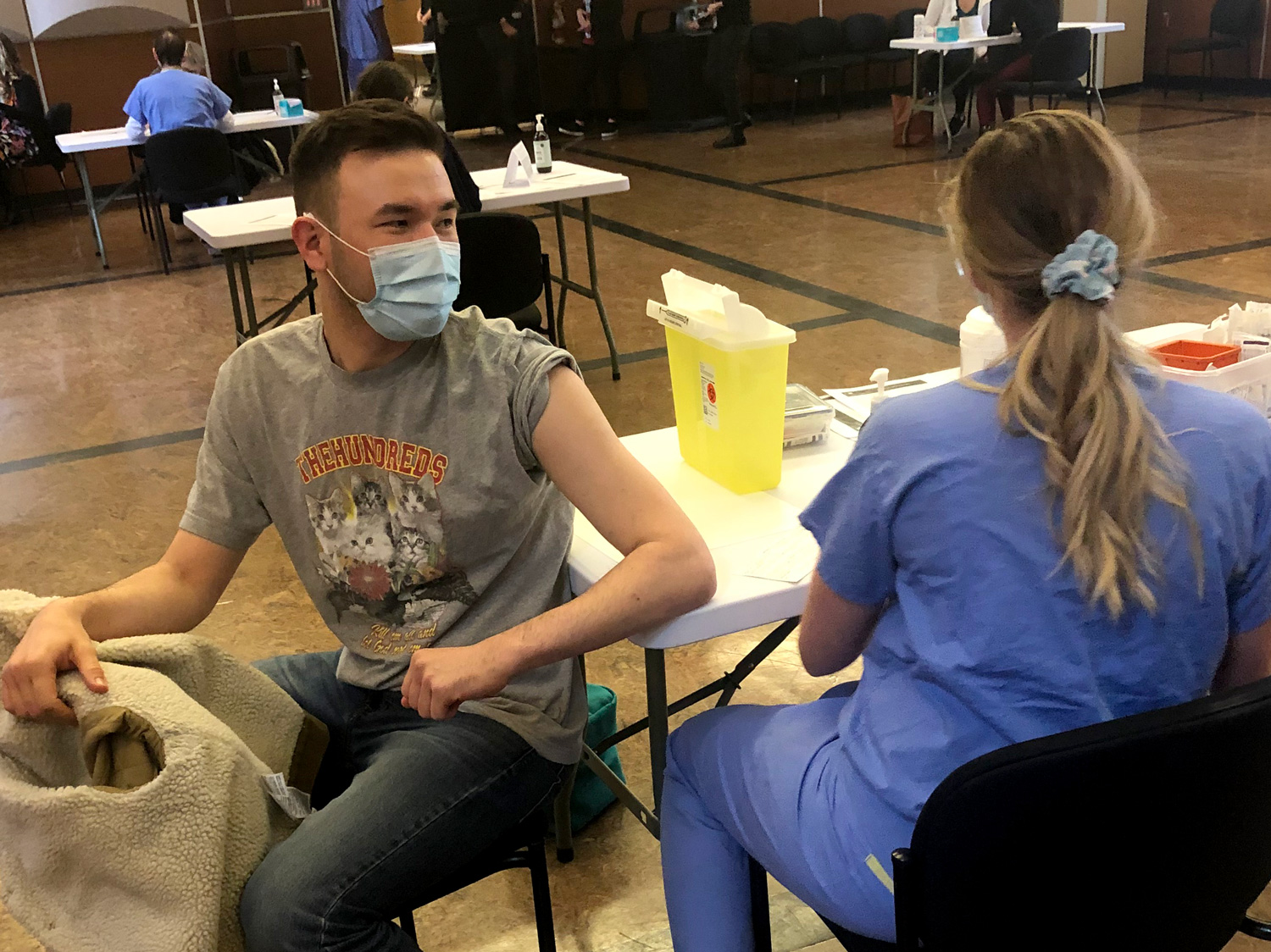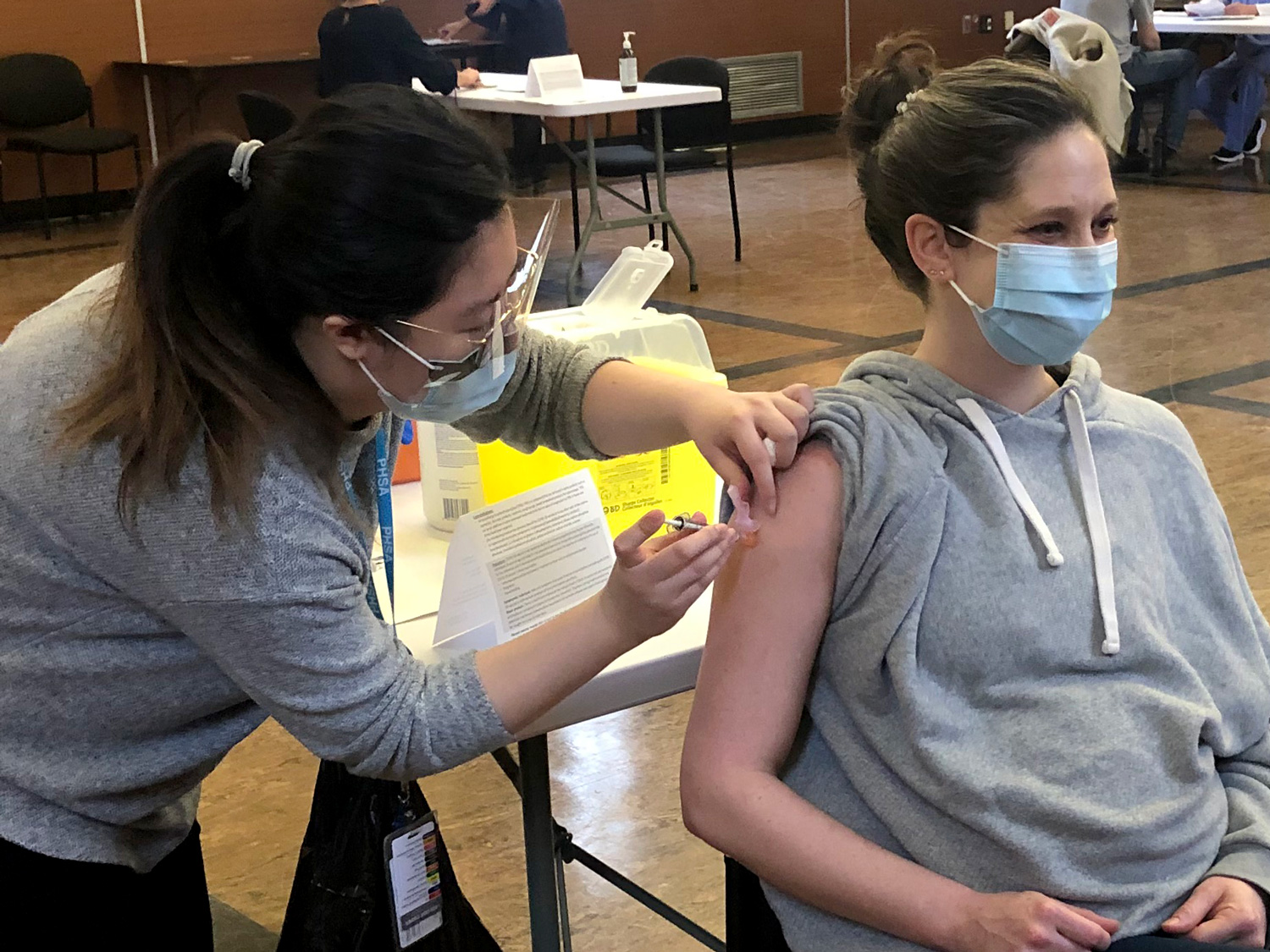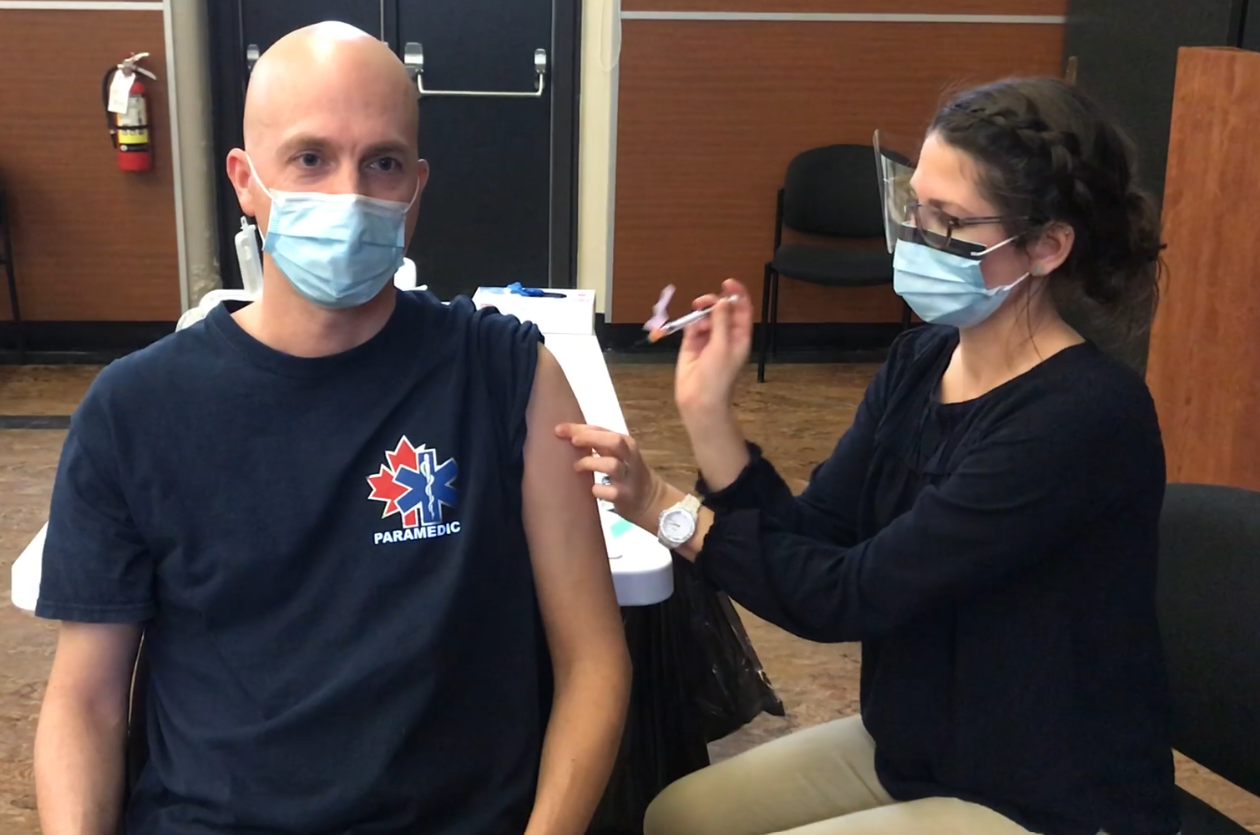When leaders at BC Children’s, BC Women’s and PHSA – which operates the hospitals – found out they were about to get a first round of COVID-19 vaccine doses, they had less than 24 hours to set up the vaccine clinic, organize a line-up of eligible staff and administer the first dose.
“It’s important PHSA health-care workers have access to the vaccine to keep them safe so they can continue to provide high quality care to their patients and go home healthy to their families,” says Christy Hay, the Co-Lead of the PHSA Vaccine Planning Team and Senior Director of Clinical Operations at BC Children’s Hospital.
“Vaccinating health-care workers will also work to preserve our health-care system as a whole.”
On Jan. 8, vaccines were administered primarily to eligible BC Children’s Emergency Department physicians and nurses, as well as care providers working in the Pediatric Intensive Care Unit, other BC Children’s and BC Women’s health-care workers providing care for COVID-19 patients and paramedics. This is consistent with vaccination prioritization in B.C., as outlined on the BC Centre for Disease Control website.
Listen to the video below to hear what staff and physicians thought about receiving the COVID-19 vaccine.
The first wave of vaccinations in B.C. are anticipated to take place December through February. Approximately 6,100 PHSA staff within intensive care units, emergency departments, medical/surgical units and paramedics directly involved in COVID-19 response have been identified as part of this provincial priority population grouping. PHSA also has staff at regional health authority sites in high-risk or outbreak areas who have been vaccinated, such as labs and supply chain workers.
 Teri MacDonald, a nurse in the BC Children’s Emergency Department, was the first at the hospital to roll up her sleeve for the Pfizer-BioNTech COVID-19 vaccine. She feels it’s important to protect her patients – and grateful this will also protect her husband at home, who is over 60 years old. She even stayed at the vaccine clinic to administer it for others as she is a peer nurse immunizer and had completed her COVID 19 immunization training.
Teri MacDonald, a nurse in the BC Children’s Emergency Department, was the first at the hospital to roll up her sleeve for the Pfizer-BioNTech COVID-19 vaccine. She feels it’s important to protect her patients – and grateful this will also protect her husband at home, who is over 60 years old. She even stayed at the vaccine clinic to administer it for others as she is a peer nurse immunizer and had completed her COVID 19 immunization training.
“I think it’s important to get vaccinated for everything that’s available and for the safety and health of everyone in the world,” says Teri.
For some, getting the vaccine was an emotional experience.
“It’s a huge weight off my chest,” says Kyle Yrjola, a nurse in the BC Children’s Emergency Department. “This has been a tumultuous time for everyone… It’s an incredible feeling to be at this point right now.”
 Kyle lost his 98-year-old grandmother during the pandemic and couldn’t say goodbye to her because he provides direct care to COVID-positive patients.
Kyle lost his 98-year-old grandmother during the pandemic and couldn’t say goodbye to her because he provides direct care to COVID-positive patients.
“Not only does this protect myself but it protects my family, it protects my neighbours, and it protects my patients,” he says. “I want to prevent the loss of loved ones for everyone else.”
Dr. Garth Meckler, the Division Head of Pediatric Emergency Medicine at BC Children’s, got his shot. He sees COVID-19 positive patients on a regular basis.
 “I don’t think this virus is going to go away. I think, while we all need to continue social distancing and hand washing, this is another tool in the area of getting this virus under control,” he says.
“I don’t think this virus is going to go away. I think, while we all need to continue social distancing and hand washing, this is another tool in the area of getting this virus under control,” he says.
BC Children’s Emergency Department physician Dr. Meghan Gilley received her first dose of the vaccine. She also treats COVID-positive patients.
 “I’m just really excited,” she says. “Getting control of this virus that’s taken over our society and our daily life and protecting the vulnerable people in our community… I’m really excited about being able to do my part.”
“I’m just really excited,” she says. “Getting control of this virus that’s taken over our society and our daily life and protecting the vulnerable people in our community… I’m really excited about being able to do my part.”
She also wants to protect her patients and her family, including someone special in her life.
“I’d like to protect my 85-year-old Grandma who makes amazing bread and I would like to keep receiving that homemade bread from her and keep having visits with her when this is all under control.”
Maggie Wong is a registered nurse in the Emergency Department was among the staff receiving their first dose of the COVID-19 vaccine.

“I think it’s a sign of hope. Personally I feel very relieved and I feel very safe today,” she says. “I would like to protect my parents who have co-morbidities, who are older and also grandparents who are also much older… or even people who we see on the streets, who we don’t know their background, we don’t know what they’ve gone through – that maybe they can’t get vaccines. I want to protect those in our community.”
She’s eager to reduce the impact the pandemic is having on people’s health and everyday lives.
“We know that the effects have been devastating. We can start to hope for going back to work for many people, and going back to see loved ones in nursing homes and our family who aren’t in the same city or town we live in.”
Two BC Emergency Health Services (BCEHS) Infant Transport Team (ITT) paramedics had just arrived at BC Children’s and BC Women’s for their shift that afternoon and were able to get their first shot of the vaccine at the clinic. Since early January, hundreds of BCEHS paramedics have been receiving the COVID-19 vaccine at hospitals and clinics around the province.
 “I just think we have to all do our part to stop this pandemic,” says Brent McCuaig, an ITT paramedic. “It seems to be getting worse, instead of better so the sooner we’re all vaccinated, hopefully, the sooner it’s all under control.”
“I just think we have to all do our part to stop this pandemic,” says Brent McCuaig, an ITT paramedic. “It seems to be getting worse, instead of better so the sooner we’re all vaccinated, hopefully, the sooner it’s all under control.”
“It’s that much more protection for myself, my patients and my family,” says Jeff Scott, also an ITT paramedic.
 By the end of the day, the first COVID-19 vaccination clinic at BC Children’s and BC Women’s was able to vaccinate 188 eligible health-care workers.
By the end of the day, the first COVID-19 vaccination clinic at BC Children’s and BC Women’s was able to vaccinate 188 eligible health-care workers.
“I just want to thank those who collaborated across the health authorities, specifically Vancouver Coastal Health,” says Christy. “We’ve got their staff here supporting the clinic. We had a meeting with their leaders to help us put the logistics in place to stand this up in an under-24-hour period. It’s just been an amazing collaboration.”
Vaccines are expected to continue arriving each week in B.C., in increasing quantities, with targeted deployment for people in priority groups. As supply becomes more readily available, the vaccine will be available to every eligible British Columbian who wants to be immunized.
Expected timelines will depend on vaccine approval and availability. When people in B.C. decide to get the COVID-19 vaccine, they are not only protecting themselves from the virus, they are also protecting everyone around them. If a majority of British Columbians get the COVID-19 vaccine, this would reduce transmission rapidly.
For more information on getting a vaccine, see the BCCDC website.
